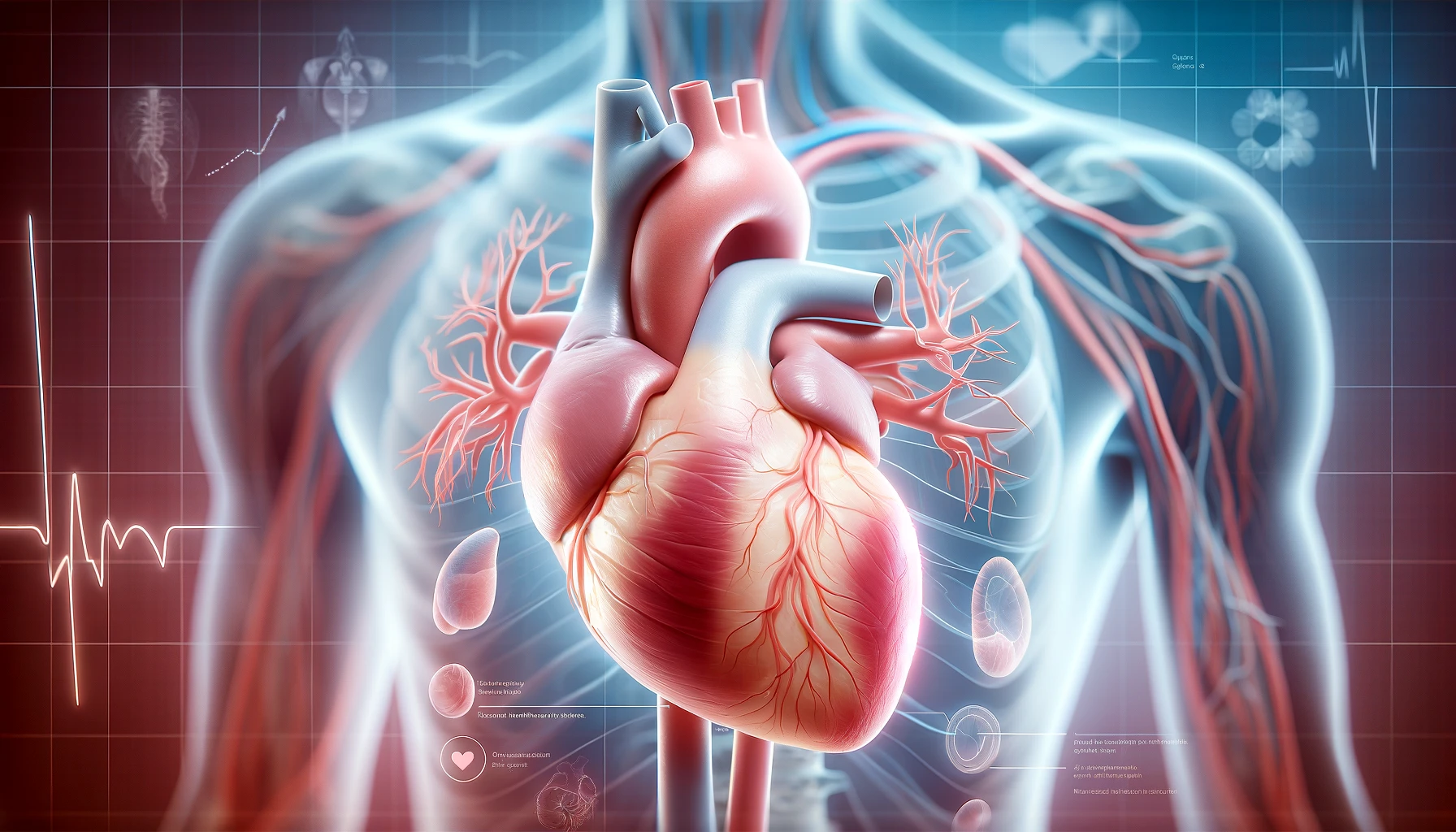The ongoing impact of COVID-19 on global health cannot be overstated. While the immediate effects of the virus have been widely documented, the long-term consequences, particularly on cardiovascular health, are becoming increasingly evident. As we navigate the post-pandemic world, it is crucial to understand the potential risks and take proactive steps to safeguard our heart health.
COVID-19 has been linked to a range of cardiovascular complications, including myocarditis, heart failure, and other heart-related issues. These complications can arise even in individuals who experienced mild or asymptomatic cases of the virus. The importance of focusing on cardiovascular health post-COVID cannot be emphasized enough, as neglecting this aspect can lead to severe and potentially life-threatening conditions. Preventive measures play a vital role in mitigating the risk of heart problems after COVID-19. By adopting a comprehensive approach that includes lifestyle modifications, regular medical check-ups, and staying informed about the latest research, individuals can significantly reduce their chances of developing COVID-related heart problems. This article will delve into various strategies and recommendations to help you maintain optimal heart health in the aftermath of the pandemic. By staying informed and taking proactive measures, we can protect our hearts and ensure a healthier future.
Understanding Post-COVID Cardiovascular Complications
Common Complications
COVID-19 has been associated with a variety of cardiovascular complications, which can manifest even after the acute phase of the infection has resolved. Understanding these complications is crucial for effective prevention and management. Myocarditis is one of the most frequently observed complications. This condition involves inflammation of the heart muscle, which can impair the heart’s ability to pump blood effectively. COVID-19 myocarditis can lead to symptoms such as chest pain, fatigue, and shortness of breath. In severe cases, it can result in heart failure or sudden cardiac death. Heart failure is another significant concern. COVID-19 and heart failure are closely linked, particularly in individuals with pre-existing cardiovascular conditions. The virus can exacerbate existing heart issues or trigger new ones, leading to a decline in heart function. Symptoms of heart failure include persistent fatigue, swelling in the legs and ankles, and difficulty breathing, especially during physical activity. Arrhythmias, or irregular heartbeats, are also common among COVID-19 survivors. These can range from benign palpitations to life-threatening conditions like atrial fibrillation or ventricular tachycardia. Arrhythmias can cause dizziness, fainting, and an increased risk of stroke. Monitoring heart rhythm and seeking medical advice if irregularities are detected is essential for managing this complication.
Risk Factors
Several risk factors can increase the likelihood of developing post-COVID cardiovascular complications. Understanding these factors can help individuals and healthcare providers take proactive measures to mitigate risks. Age is a significant risk factor. Older adults are more susceptible to severe COVID-19 infections and, consequently, to long-term COVID heart issues. The aging process naturally weakens the cardiovascular system, making it more vulnerable to the virus’s effects. Pre-existing health conditions, such as hypertension, diabetes, and chronic heart disease, also elevate the risk. Individuals with these conditions should be particularly vigilant about monitoring their heart health post-COVID. Managing these underlying conditions through medication, lifestyle changes, and regular medical check-ups can help reduce the risk of COVID-related heart problems. The severity of the COVID-19 infection itself plays a crucial role. Those who experienced severe symptoms or required hospitalization are at a higher risk of developing cardiovascular effects of COVID. The intense inflammatory response triggered by the virus can cause lasting damage to the heart and blood vessels, leading to complications such as COVID-19 heart damage and COVID-19 vascular complications.
Warning Signs to Watch For
Recognizing the warning signs of post-COVID heart symptoms is essential for early intervention and treatment. Being aware of these signs can help individuals seek medical attention promptly, potentially preventing more severe complications. Shortness of breath is a common symptom that should not be ignored. While it can be a residual effect of the respiratory aspects of COVID-19, it may also indicate underlying heart issues. Persistent or worsening shortness of breath, especially during physical activity, warrants a thorough cardiovascular evaluation. Chest pain is another critical warning sign. It can range from mild discomfort to severe pain and may be accompanied by other symptoms such as sweating, nausea, or lightheadedness. Chest pain should always be taken seriously, as it could indicate conditions like myocarditis or a heart attack. Palpitations, or the sensation of a racing or irregular heartbeat, are also concerning. While occasional palpitations can be benign, frequent or severe episodes may signal arrhythmias or other heart conditions. Monitoring heart rate and rhythm and consulting a healthcare provider if abnormalities are detected is crucial for managing these symptoms. By understanding the common complications, risk factors, and warning signs associated with post-COVID cardiovascular issues, individuals can take proactive steps to protect their heart health. Early detection and intervention are key to preventing long-term damage and ensuring a healthier future.
Preventive Strategies
Regular Cardiovascular Check-ups
Regular cardiovascular check-ups are essential for maintaining post-COVID heart health. Routine visits with a cardiologist can help detect and manage any emerging heart issues after COVID, ensuring timely intervention and treatment. The importance of routine visits with a cardiologist cannot be overstated. These specialists are trained to identify subtle signs of cardiovascular effects of COVID that may not be apparent to general practitioners. Regular consultations allow for continuous monitoring and early detection of conditions such as COVID-19 myocarditis and other COVID-induced heart conditions. Establishing a relationship with a cardiologist ensures that any changes in heart health are promptly addressed. Recommended tests and screenings play a crucial role in these check-ups. Common tests include electrocardiograms (ECGs), echocardiograms, and blood tests to measure markers of heart health. Advanced imaging techniques like cardiac MRI can provide detailed insights into heart structure and function, helping to identify COVID-19 heart damage. These tests are vital for assessing the overall health of the heart and detecting any abnormalities that may require further investigation. Monitoring heart function over time is another critical aspect of regular check-ups. COVID-19 cardiac complications can develop gradually, making it essential to track heart health consistently. Regular monitoring allows for the early identification of trends or changes that may indicate the onset of long-term COVID heart issues. This proactive approach enables timely adjustments to treatment plans, reducing the risk of severe complications.
Lifestyle Changes
Adopting healthy lifestyle changes is a powerful strategy for preventing COVID-related heart problems. Simple yet effective modifications to daily habits can significantly reduce the risk of developing cardiovascular complications. A healthy diet rich in fruits, vegetables, and whole grains is fundamental to heart health. These foods provide essential nutrients and antioxidants that support cardiovascular function and reduce inflammation. Incorporating lean proteins, healthy fats, and reducing the intake of processed foods and sugars can further enhance heart health. A balanced diet helps manage weight, blood pressure, and cholesterol levels, all of which are crucial for preventing COVID-19 vascular complications. Regular physical activity is another cornerstone of a heart-healthy lifestyle. Engaging in at least 150 minutes of moderate-intensity exercise per week can improve cardiovascular fitness, strengthen the heart muscle, and enhance overall well-being. Activities such as walking, cycling, swimming, and strength training are excellent options. Exercise also helps manage stress, which can have a positive impact on heart health. For those recovering from COVID-19, it is essential to start slowly and gradually increase activity levels under medical supervision. Quitting smoking and limiting alcohol intake are critical steps in reducing the risk of COVID heart disease. Smoking is a major risk factor for cardiovascular disease, and quitting can significantly improve heart health. Similarly, excessive alcohol consumption can lead to high blood pressure, heart failure, and other cardiovascular issues. Limiting alcohol to moderate levels, as recommended by health guidelines, can help protect the heart.
Medication Adherence
Adhering to prescribed medications is vital for managing post-COVID heart symptoms and preventing complications. Medications play a crucial role in controlling risk factors and maintaining heart health. The importance of following prescribed treatments cannot be emphasized enough. Medications such as beta-blockers, ACE inhibitors, and statins are commonly prescribed to manage conditions like hypertension, heart failure, and high cholesterol. These medications help reduce the strain on the heart, lower blood pressure, and prevent the progression of cardiovascular disease. Skipping doses or discontinuing medication without medical advice can lead to worsening symptoms and increased risk of COVID-19 cardiac complications. Potential medications to manage risk include anticoagulants, which prevent blood clots, and anti-inflammatory drugs that reduce heart inflammation. These medications are particularly relevant for individuals with a history of COVID-19 myocarditis or other COVID-induced heart conditions. It is essential to discuss the benefits and potential side effects of these medications with a healthcare provider to ensure they are appropriate for your specific situation. Consultation with healthcare providers before stopping any medication is crucial. Abruptly discontinuing medication can have serious consequences, including rebound effects that exacerbate heart issues. Healthcare providers can offer guidance on safely tapering off medications if necessary and suggest alternative treatments to manage symptoms effectively. By incorporating regular cardiovascular check-ups, adopting healthy lifestyle changes, and adhering to prescribed medications, individuals can significantly reduce the risk of post-COVID cardiovascular complications. These preventive strategies are essential for maintaining optimal heart health and ensuring a better quality of life in the aftermath of the pandemic.
Managing Mental Health and Stress
Connection Between Mental Health and Cardiac Health
The connection between mental health and cardiac health is well-documented, and managing stress and emotional well-being is crucial for maintaining post-COVID heart health. The impact of stress on the heart can be profound, contributing to a range of cardiovascular issues. The impact of stress on the heart is significant. Chronic stress can lead to increased blood pressure, elevated heart rate, and heightened levels of stress hormones like cortisol. These physiological changes can strain the cardiovascular system, increasing the risk of COVID-19 cardiac complications. Stress can also exacerbate existing heart conditions, making it essential to adopt effective stress management techniques. Anxiety and its correlation with cardiovascular complications are areas of growing concern. Anxiety can trigger the “fight or flight” response, leading to increased heart rate and blood pressure.
Over time, this can contribute to the development of heart issues after COVID. Individuals experiencing anxiety may also engage in unhealthy behaviors, such as poor diet and lack of exercise, further increasing their risk of COVID-related heart problems. Depression and heart disease are closely linked. Depression can lead to a lack of motivation to engage in healthy behaviors, such as regular exercise and medication adherence. It can also cause changes in the body’s stress response, leading to inflammation and other factors that contribute to cardiovascular disease. Addressing depression is crucial for reducing the risk of long-term COVID heart issues and ensuring overall well-being.
Techniques for Stress Management
Effective stress management techniques are essential for maintaining both mental and cardiac health. Incorporating these techniques into daily life can help mitigate the cardiovascular effects of COVID and promote overall well-being. Mindfulness and meditation are powerful tools for managing stress. These practices involve focusing on the present moment and cultivating a sense of calm and relaxation. Research has shown that mindfulness and meditation can reduce stress hormones, lower blood pressure, and improve heart rate variability. Regular practice can help individuals manage the emotional and physical stressors associated with COVID-19 and heart failure. Physical relaxation techniques, such as deep breathing exercises, progressive muscle relaxation, and yoga, can also be beneficial. These techniques help activate the body’s relaxation response, reducing stress and promoting cardiovascular health.
Engaging in regular physical relaxation practices can help alleviate symptoms of COVID heart inflammation and other stress-related heart issues. Seeking professional mental health support is crucial for individuals struggling with anxiety, depression, or other mental health concerns. Therapists and counselors can provide valuable guidance and support, helping individuals develop coping strategies and manage stress effectively. Professional support can also address underlying mental health conditions that may contribute to COVID-induced heart conditions.
Building a Support Network
Building a strong support network is essential for managing stress and maintaining post-COVID heart health. Family, friends, and professional support can provide emotional and practical assistance, helping individuals navigate the challenges of recovery. Family and friends play a vital role in providing emotional support and encouragement. Having a strong social network can help reduce feelings of isolation and stress, promoting overall well-being. Loved ones can also assist with practical tasks, such as attending medical appointments or helping with daily activities, reducing the burden on individuals recovering from COVID-19 heart damage. Joining support groups can provide additional benefits. Support groups offer a sense of community and understanding, allowing individuals to share their experiences and learn from others facing similar challenges. These groups can provide valuable information and resources, helping individuals manage post-COVID heart symptoms and improve their quality of life.
Professional guidance from therapists or counselors is also essential. Mental health professionals can offer personalized support and strategies for managing stress and emotional well-being. They can help individuals develop healthy coping mechanisms, address underlying mental health conditions, and navigate the complexities of post-COVID recovery. By understanding the connection between mental health and cardiac health, adopting effective stress management techniques, and building a strong support network, individuals can significantly reduce the risk of post-COVID cardiovascular complications. These strategies are essential for maintaining both mental and physical well-being, ensuring a healthier and more resilient future.
Conclusion
Recapping the importance of preventing heart problems post-COVID is essential to understanding the broader implications of the pandemic on long-term health. COVID-19 has not only posed immediate threats but has also left a lasting impact on cardiovascular health. The emergence of long-term COVID heart issues, such as myocarditis, heart failure, and arrhythmias, underscores the need for vigilance and proactive measures. These complications can affect individuals of all ages and health backgrounds, making it imperative to prioritize heart health in the post-COVID era.
The cardiovascular effects of COVID are multifaceted, involving direct viral damage to the heart, inflammation, and the exacerbation of pre-existing conditions. COVID-19 heart damage can manifest in various forms, from subtle changes in heart function to severe, life-threatening conditions. Understanding these risks and recognizing the warning signs, such as shortness of breath, chest pain, and palpitations, are crucial steps in early detection and intervention. By staying informed and vigilant, individuals can take control of their heart health and mitigate the long-term impacts of the virus. The importance of preventive strategies cannot be overstated. Regular cardiovascular check-ups, healthy lifestyle changes, and medication adherence are foundational elements in maintaining post-COVID heart health. These measures, combined with effective stress management and mental health support, create a comprehensive approach to preventing COVID-related heart problems. By adopting these strategies, individuals can significantly reduce their risk of developing severe complications and ensure a healthier future. A call to action to implement preventive strategies for a healthy heart is not just a recommendation but a necessity.
The ongoing impact of COVID-19 on cardiovascular health demands a proactive and informed approach. Individuals are encouraged to schedule regular check-ups with their cardiologists, adhere to prescribed medications, and make meaningful lifestyle changes. A diet rich in fruits, vegetables, and whole grains, combined with regular physical activity, can have a profound impact on heart health. Quitting smoking and limiting alcohol intake further reduce the risk of COVID heart disease and other cardiovascular issues. Stress management and mental health support are equally important. Techniques such as mindfulness, meditation, and physical relaxation can help alleviate stress and promote overall well-being.
Building a strong support network, including family, friends, and professional mental health providers, ensures that individuals have the resources and support they need to navigate the challenges of post-COVID recovery. Taking these steps is not just about preventing heart problems but about embracing a holistic approach to health and well-being. The lessons learned from the pandemic highlight the interconnectedness of physical and mental health and the importance of a comprehensive strategy in maintaining overall wellness. By prioritizing heart health and implementing preventive measures, individuals can protect themselves from the long-term effects of COVID-19 and enjoy a better quality of life.
In conclusion, the journey to preventing heart problems after COVID-19 is a multifaceted one, requiring a combination of medical vigilance, lifestyle changes, and mental health support. The stakes are high, but the rewards are even greater. By taking proactive steps today, individuals can safeguard their heart health and build a foundation for a healthier, more resilient future. The time to act is now, and the path to a healthy heart is within reach.





